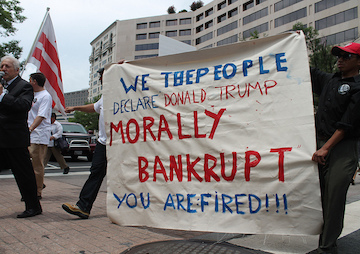The Potency of Trump’s Pitchfork Populism
The blustery billionaire's "us" is nowhere near a majority of the U.S. electorate, but it might be enough to win him the Republican nomination for president. And even if he falls short, the forces he has loosed will not easily be tamped down. Elvert Barnes
/ CC BY 2.0
Elvert Barnes
/ CC BY 2.0
Donald Trump became the driving force in American politics by giving voice to anger, fear and resentment that were already there, just below the surface, waiting for their moment and messenger.
At present, Trump’s target is any believer in Islam who seeks to enter the United States. Back in June, he launched his campaign with invective toward any Latino immigrant living in this country without documents. He attacks President Obama less for his policies than for his identity — not for what the president does but for who he is. Trump has made himself the champion of a fading, embattled “us” in a life-or-death struggle against a swarming, threatening “them.”
The blustery billionaire’s “us” is nowhere near a majority of the U.S. electorate, but it might be enough to win him the Republican nomination for president. And even if he falls short, the forces he has loosed will not easily be tamped down.
Trump’s rally Monday in Mount Pleasant, South Carolina, was a lesson in what his campaign is really about. Just hours earlier, he had issued a statement saying all Muslims should be barred entry to the United States in light of the San Bernardino terrorist rampage. The subtext was clear: All Muslims are potential terrorists. We have to keep them out.
Some commentators pronounced, for the umpteenth time, that “Trump has finally gone too far.” But the Mount Pleasant crowd apparently thought otherwise.
“I wrote something today that I think is very very salient, very important and probably not politically correct, but I don’t care,” Trump said. Then he read his no-Muslims statement and the crowd responded with a huge, raucous ovation.
And Muslims were not his only target at that rally. He railed at the journalists covering the event, pointing them out at the back of the room and calling them “scum” for supposedly never showing how big his crowds are. He also focused the crowd’s attention on a Black Lives Matter protester in the back of the room, declaring that he should be ejected but treated gently.
Trump’s audience in Mount Pleasant appeared to be overwhelmingly white. If it mirrored his support base in the polls, it was also older and less educated than the Republican electorate as a whole. A vastly wealthy tycoon who was born with a silver spoon in his mouth and lives in a Manhattan penthouse has somehow become the unlikely spokesman for a segment of voters who feel most threatened by what the nation has become.
Demographic change means that whites will no longer be a majority by the middle of the century. When you call the electric company to pay a bill, you’re asked to push as a button “para continuar en espanol.” Incomes are stagnant except for those at the very top; manufacturing jobs are gone; and if you don’t have a college degree, you’re trapped on the wrong side of the wall between middle-class comfort and lower-class misery.
To add insult to injury, serving his second term as president is a black man who was educated at Ivy League schools and whose father was a Muslim. For Trump’s supporters, it is hard to imagine a more perfect target for fear and loathing.
The people at Trump’s rallies do not necessarily believe he will do all the things he promises. Is it really possible to round up and deport 11 million undocumented immigrants? Will Mexico really pay for building an impenetrable wall along the border? Is it legally or practically feasible to identify and turn back every Muslim seeking entry to the country? Is a pledge to “bomb the s—” out of the Islamic State any different from what Obama is already doing or any more likely to prevent another terrorist attack?
It’s not that Trump will do the impossible, it’s that he might do something.
Trump gives unfiltered voice to the anger and frustration some Americans feel. When he says he refuses to be “politically correct,” what he means is that he rejects the traditional constraints of public discourse. He doesn’t chastise his supporters for racism, nativism or religious bigotry; instead, he validates such views, bringing them out of the closet where they had been hiding.
Whatever happens to Trump’s candidacy, he has exposed a kind of rage that we haven’t seen in many years. His pitchfork populism is not the worldview of most Americans, to be sure. But it is likely to remain a significant political force – even if the Republican establishment somehow quashes the Trump rebellion.
Your support matters…Independent journalism is under threat and overshadowed by heavily funded mainstream media.
You can help level the playing field. Become a member.
Your tax-deductible contribution keeps us digging beneath the headlines to give you thought-provoking, investigative reporting and analysis that unearths what's really happening- without compromise.
Give today to support our courageous, independent journalists.






You need to be a supporter to comment.
There are currently no responses to this article.
Be the first to respond.